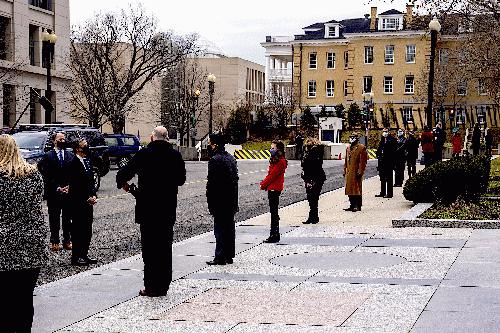From Consortium News
A return to diplomacy: Let us hold this thought up to the light. Among all the promises President Joe Biden is going to break over the next four years, this will prove the most fraudulent and, in the larger scheme of things, the most consequential of his breaches.
As of last week, it is the crisis over the agreement governing Iran's nuclear programs that stands to demonstrate the truth of this judgment. On Sunday Tehran appeared to put the Biden administration on notice that it has two weeks to get serious about reentering diplomatic negotiations, after which time the shutter will come down on the window of opportunity. As I have previously made clear in this space, I see no evidence that Biden's national-security people will prove either serious or wise as they address this critical question.
In truth, there is very little American diplomacy to return to. The late and estimable Boutros Boutros-Ghali explained this memorably in Unvanquished, the memoir he published in 1999, after the U.S. forced him out as the UN's secretary-general because he was not sufficiently obsequious. "Only the weak rely on diplomacy," the celebrated Egyptian wrote. "The United States sees little need of it, for power is enough."
How very on the mark. "The Roman Empire had no need of diplomacy," the learned Boutros-Ghali elaborated. "Nor does the United States: Diplomacy is perceived by an imperial power as a waste of time and prestige and a sign of weakness."
This is the tradition the Biden administration will return to. Let us call it the diplomacy of no diplomacy.
There is much talk now of demilitarizing American foreign policy, and it is a fine thing that it is at last permissible to raise the topic in polite conversation. "Time and time again, we've seen how over-reliance on military tools can lead us into policy quicksand," William Burns, a career diplomat and now named CIA director, said in an interview last spring with The Foreign Service Journal. "Time and time again, we've fallen into the trap of overusing or prematurely using force. That tends to make diplomacy a distorted and under-resourced afterthought."
The right thoughts, surely. But I urge those assuming Burns' remarks have anything to do with the new administration's direction to temper their expectations. It is policy to say such things; it is not how the Biden administration intends to conduct policy.
Iran as Early Indicator
The Iran question was fated to stand as an early indicator of President Biden's foreign policy principles (if this is my word). Tehran now seems determined, altogether rightfully, to force the issue. Good, I say. The sooner we understand the what's-what of this administration the better.
The Joint Comprehensive Plan of Action, as the nuclear agreement is formally known, lifted U.S. and international sanctions in return for Iran's reduction of uranium enrichment under enhanced International Atomic Energy Agency monitoring. The IAEA repeatedly reported that Iran was sticking to its part of the deal. Given that President Donald Trump withdrew from the six-nation accord in 2018, Biden's professed intent during his presidential campaign was to restore the U.S. as a signatory to it.
But it was clear from the outset that Biden's promise was unlikely to prove policy, chiefly because the Israelis made it plain once Biden won the White House that they would accept no such outcome.
We now watch as Biden and his foreign policy people effectively allow Israel to dictate the conditions under which Biden can fulfill his campaign promise.

Secretary of State Antony Blinken greets employees as he arrives at the U.S. Department of State on Jan. 27. (State Department, Ron Przysucha)
(Image by (State Department, Ron Przysucha)) Details DMCA
The Israeli leadership is at this point divided but only tactically. Aviv Kohavi, the Israeli Defense Forces' chief of staff, said 10 days ago that Washington ought to adopt the Trump policy and repudiate the accord altogether. But Yossi Cohen, head of Mossad and a confidant of Prime Minister Benjamin Netanyahu, is now making final plans to consult in Washington at the end of the month with Biden, CIA Director Burns, and Jake Sullivan, Biden's national security adviser.
(Note: You can view every article as one long page if you sign up as an Advocate Member, or higher).






